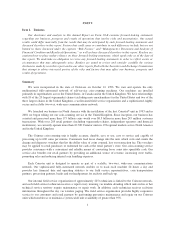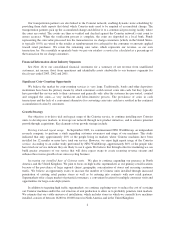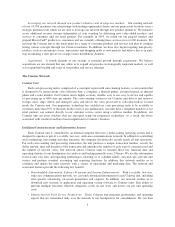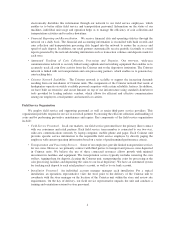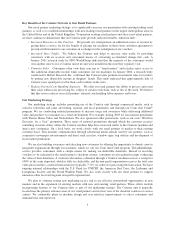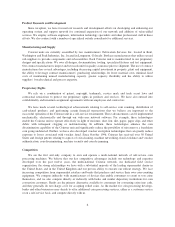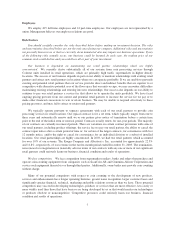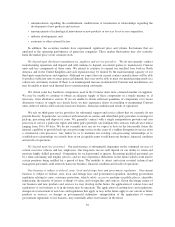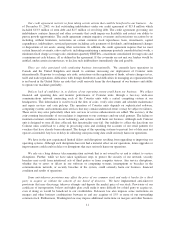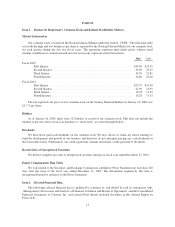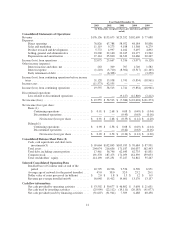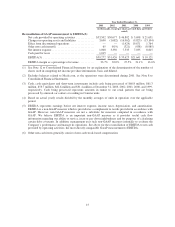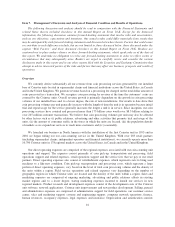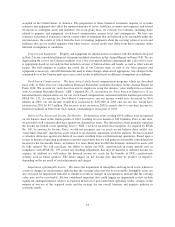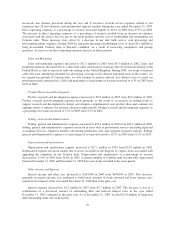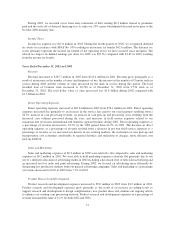Redbox 2003 Annual Report Download - page 15
Download and view the complete annual report
Please find page 15 of the 2003 Redbox annual report below. You can navigate through the pages in the report by either clicking on the pages listed below, or by using the keyword search tool below to find specific information within the annual report.Our credit agreement restricts us from taking certain actions that could be beneficial to our business.As
of December 31, 2003, we had outstanding indebtedness under our credit agreement of $15.8 million which
included $13.3 million of term debt and $2.5 million of revolving debt. The credit agreement governing our
indebtedness contains financial and other covenants that could impair our flexibility and restrict our ability to
pursue growth opportunities. The credit agreement contains negative covenants and restrictions on actions by us
including, without limitation, restrictions on certain common stock repurchases, liens, investments, capital
expenditures, indebtedness, restricted payments including cash payments of dividends, and fundamental changes
or dispositions of our assets, among other restrictions. In addition, the credit agreement requires that we meet
certain financial covenants, ratios and tests, including maintaining a minimum quarterly consolidated net worth,a
minimum fixed charge coverage ratio, minimum quarterly EBITDA, a maximum consolidated leverage ratio and
a minimum net cash balance, all as defined in the agreement. If the covenants are not met our lenders would be
entitled, under certain circumstances, to declare such indebtedness immediately due and payable.
There are risks associated with conducting business internationally. We currently have operations in
Canada and the United Kingdom and intend to continue increasing our deployment of Coinstar units
internationally. Exposure to exchange rate risks, restrictions on the repatriation of funds, adverse changes in tax,
tariff and trade regulations, difficulties with foreign distributors and difficulties in managing an organization that
is not based in the United States are risks that could seriously harm the development of our business and ability
to operate our machines profitably.
Defects, lack of confidence in, or failures of our operating system could harm our business. We collect
financial and operating data and monitor performance of Coinstar units, through a two-way wide-area
communications network connecting each of the Coinstar units with a central computing system at our
headquarters. This information is used to track the flow of coins, verify coin counts and schedule maintenance
and repair services and coin pick-up. The operation of Coinstar units depends on sophisticated software,
computing systems and communication services that may contain undetected errors or may be subject to failures.
These errors may arise particularly when new services or service enhancements are added. The accuracy of the
coin-counting functionality of our machines is important to our customers and our retail partners. The failure to
maintain customer confidence in our technology and systems could harm our business. Although each Coinstar
unit is designed to store all data collected, this functionality may fail. Our inability to collect the data from our
Coinstar units could lead to a delay in processing coins and crediting the accounts of our retail partners for
vouchers that have already been redeemed. The design of the operating systems to prevent loss of data may not
operate as intended. Any loss or delay in collecting coin processing data could seriously harm our operations.
We have in the past experienced limited delays and disruptions resulting from upgrading or improving our
operating systems. Although such disruptions have not had a material effect on our operations, future upgrades or
improvements could result in delays or disruptions that may seriously harm our operations.
We rely on a long distance telecommunication network that is not owned by us and is subject to service
disruptions. Further, while we have taken significant steps to protect the security of our network, security
breaches may result from intentional acts of third parties or from computer viruses. Any service disruptions,
whether due to errors or delays in our software or computing systems, interruptions or breaches in the
communications network, or security breaches of the system, could seriously harm our business, financial
condition and results of operations.
Some anti-takeover provisions may affect the price of our common stock and make it harder for a third
party to acquire us without the consent of our board of directors. We have implemented anti-takeover
provisions that may discourage takeover attempts and depress the market price of our stock. Provisions of our
certificate of incorporation, bylaws and rights plan could make it more difficult for a third party to acquire us,
even if doing so would be beneficial to our stockholders. Delaware law also imposes some restrictions on
mergers and other business combinations between us and any acquirer of 15% or more of our outstanding
common stock. Furthermore, Washington law may impose additional restrictions on mergers and other business
11


